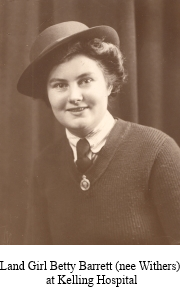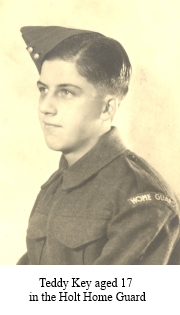Illustrated History of Holt, Volume Two. Wartime and Post-War Holt
A reprint of this is being released this year, 2024, as stocks have now almost all been sold.These will be available from the Holt Bookshop, telephone 01263 715858, or from Jarrold's Book Department in Norwich, telephone 01603 660661.
This volume was first published by the Holt Society in 2015 to coincide with the 50th anniversary of the foundation of the Society. Volume Two picks up where Keith Entwhistle's first volume breaks off in the late 1920s and early 1930s and carries the story of Holt through to the late 1960s. Inevitably, the war years of 1939 to 1945 dominate the book and those chapters covering the conflict are the centre piece of the history. The experiences and memories of people who lived in and around Holt during that time drive the narrative and all sorts of interesting material has come to light for the researcher and writer, John Roebuck, to work on.

Of particular interest are the stories of those who were caught up in the war; the tragic stories of those who served in the armed services and did not survive and of those who returned, scarred by their experiences, to life back in Holt. The war also had a dramatic impact on Holt itself as the town was in the midst of one of the most heavily militarised parts of the country. The result of all that was a huge military presence around Holt that it is impossible to imagine today. Gresham's School was evacuated to Cornwall to provide an HQ for the army, a key radar station outside Holt at West Beckham tracked incoming enemy aircraft, and airfields at places like Langham housed the bombers that wreaked destruction on German cities. The beaches were 'no go' areas for local civilians as they were mined and wired and heavily defended with pill boxes and dugouts. A huge army camp at Weybourne was constructed with a powerful battery of guns pointing out to sea. A visit to the Muckleburgh Collection, which is on that site, gives a good impression of its extent and importance. The soldiers billeted in Holt garrisoned the Weybourne camp and the coastal defences.

Holt's roads rumbled to the convoys of trucks passing through and the clatter of Bren gun carrier tracks. The children went to school with their gas masks and watched the air raid shelters being built in their yards and lokes. The Home Guard trained and waited. The families gave up their fathers and sons to the armed services. The WI knitted 'comforters' and the girls waited for their call ups to munitions factories, the land army or one of the three regular forces.
As in many communities around Britain, the end of the war was greeted in Holt with a strange sense of weariness. Victory in Europe had seemed inevitable once the Allies were able to bomb Germany twenty four hours a day but what was not inevitable was whether communities, like Holt, could return to what they desperately wanted; a sense of 'normality'. Holt, and its people, found that a challenge. The world had moved on and Holt had to catch up.
John Roebuck would like to thank all those who have been so generous in giving their time, their memories and their resources in providing material for this book. The whole process of drafting it has been a wonderful journey down the 'memory lanes' of the dozens of interesting people who have talked about their families' lives in and around Holt. The book launch will take place on Tuesday 5th May at 6.30pm at the Holt Bookshop. Or come along to the Community Centre at 7.00pm on Friday 8th May where John Roebuck will be 'in conversation' with some of the contributors to the book and you will have a chance to purchase a copy and ask questions.

